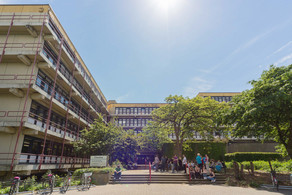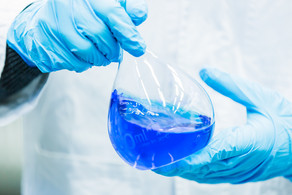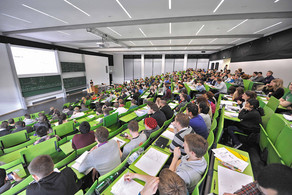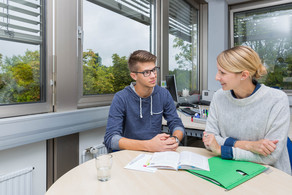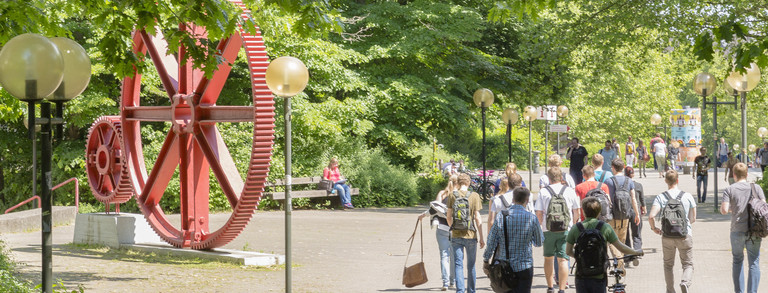Publications
2025
Szokoli, D. & Mutschler, H.
Protein-Free Catalysis of DNA Hydrolysis and Self-Integration by a Ribozyme
Nucleic Acids Research, gkae1224 (2025)
2024
Szokoli, D. & Mutschler, H.
Protein-Free Catalysis of DNA Hydrolysis and Self-Integration by a Ribozyme
bioRxiv, 2024.08. 31.610620
AL Holtmannspötter, A.L.#, Machatzke, C.#, Begemann, C., Salibi, E. Donau, C., Späth, F., Boekhoven, J.*, Mutschler, H.*
Regulating nucleic acid catalysis using active droplets
Angewandte Chemie International Edition, e202412534
Vibhute, M.A., Machatzke, C., Bigler, K., Krümplel, S., Summerer, D., Mutschler, H.
Intracellular Expression of a Fluorogenic DNA Aptamer Using Retron Eco2
eLife, 13:RP99554 (2024).
Wagner, A., Mutschler, H.
Design of Novel Synthetic RNA Replicons Based on Emesvirus zinderi
ACS Synth. Biol., 13, 1773–1780 (2024)
2023
Le Vay, K.K.*#, Salibi, E.#, Gosh, B., Tang, T-Y D.*, Mutschler, H.*
Ribozyme activity modulates the physical properties of RNA–peptide coacervates.
eLife, 12:e83543 (2023).
Wagner, A., Mutschler, H.
Design principles and applications of synthetic self-replicating RNAs.
WIREs RNA, e1803 (2023).
de Capitani, J., Mutschler, H.
The Long Road to a Synthetic Self-Replicating Central Dogma.
Biochemistry , 62, 1221-1232 (2023).
Salditt, A., Karr, L., Salibi, E., Le Vay, K., Braun, D.*, Mutschler, H.*
Ribozyme-mediated RNA synthesis and replication in a model Hadean microenvironment.
Nat Commun 14, 1495 (2023).
Salibi, E.#, Peter, B. #, Schwille, P.*, Mutschler, H.*
Periodic temperature changes drive the proliferation of self-replicating RNAs in vesicle populations.
Nat Commun 14, 1222 (2023).
Hürtgen, D., Mascarenhas, J. #, Vibhute, M. A. #, Weise, L. I. Mayr, V. S., Sourjik, V.*, Mutschler, H.*
Engineering a Synthetic RNA Segregation System.
ChemSystemsChem, e202200028 (2023).
Vibhute, M. A. *, Mutschler, H.*
A Primer on Building Life‐Like Systems.
ChemSystemsChem 5, e202200033 (2023).
2022
Le Vay K., Salibi E., Ghosh B., Tang TY-D.*, Mutschler H.*
Ribozyme-phenotype coupling in peptide-based coacervate protocells
bioRxiv 2022.10.25.513667
Salditt A., Karr L., Salibi E., Braun D.*, Mutschler H.*
Complete RNA replication cycles in a Hadean microcompartment,
19 September 2022, PREPRINT (Version 1) available at Research Square
Salibi E., Peter B., Schwille P.*, Mutschler H.*
Exchange, catalysis and amplification of encapsulated RNA driven by periodic temperature changes,
12 September 2022, PREPRINT (Version 1) available at Research Square
Wagner, A., Weise, L.I. & Mutschler, H.
In vitro characterisation of the MS2 RNA polymerase complex reveals host factors that modulate emesviral replicase activity.
Communications Biology, 2022, 5, 264
Szokoli D., Le Vay K.K., Mutschler, H.
PCR Methods for the Generation of Catalytic ssDNA.
Methods in Molecular Biology, 2022, 2439, 27-44
Le Vay K.K. & Mutschler, H.
Generation of RNA with 2′, 3′-Cyclic Phosphates by Deoxyribozyme Cleavage in Frozen Solutions
Methods in Molecular Biology, 2022, 2439, 301-309
Iglesias-Artola, J.M., Drobot, B., Kar, M., Tang, T-YD., Mutschler, H. Kreysing, M.
Charge-density reduction promotes ribozyme activity in RNA–peptide coacervates via RNA fluidization and magnesium partitioning.
Nature Chemistry, 2022, in press
2021
Le Vay K*#, Song EY#, Ghosh B, Tang T-YD*, Mutschler H*.
Enhanced ribozyme-catalyzed recombination and oligonucleotide assembly in peptide-RNA condensates.
Angewandte Chemie International Edition, 2021, 60, 26096-26104
*corresponding, #contributed equally
Matreux T#, Le Vay K#, Schmid A, Aikkila P, Belohlavek L, Çalışkanoğlu AZ, Salibi E, Kühnlein A, Springsklee C, Scheu B, Dingwell DB, Braun D, Mutschler H*, Mast CB*.
Heat flows in rock cracks naturally optimize salt compositions for ribozymes.
Nature Chemistry (2021).
#contributed equally, *corresponding authors
Wagner A, Weise L, Mutschler H.
In vitro characterisation of the MS2 RNA polymerase complex reveals novel host factors that modulate leviviral replicase activity,
12 April 2021, PREPRINT (Version 1) available at Research Square
2020
Libicher K, Mutschler H.
Probing self-regeneration of essential protein factors required for in vitro translation activity by serial transfer (2020),
Chemical Communications, 2020, 56, 15426-15429
Song EY, Jiménez EI, Lin H, Le Vay, K, Krishnamurthy R*, Mutschler H*.
Prebiotically plausible RNA activation compatible with ribozyme‐catalyzed ligation (2020),
Angewandte Chemie International Edition, 2020, 60, 2952-2957
*co-corresponding
Donau C, Späth F, Sosson M, Kriebisch B, Schnitter F, Tena-Solsona M,Kang HS, Salibi E, Sattler M, Mutschler H, Job Boekhoven J.
Active coacervate droplets as a model for membraneless organelles and protocells (2020),
Nature Communications, 11, 5167
Le Vay K, Mutschler H,
How DNA and RNA subunits might have formed to make the first genetic alphabet (2020),
Nature, 582, 33-34
Libicher K, Hornberger R, Heymann M, Kriebisch B, Mutschler H.
In vitro self-replication and multicistronic expression of large synthetic genomes (2020),
Nature Communications, 11, 904
2019
Le Vay K*, Salibi E#, Song Y#, Mutschler H*.
Nucleic acid catalysis under potential prebiotic conditions (2019),
Chemistry—An Asian Journal, https://doi.org/10.1002/asia.201901205
*corresponding authors, #contributed equally
Mutschler H*, Robinson T*, Tang TYD*, Wegner S*.
Special Issue on Bottom‐Up Synthetic Biology (2019),
ChemBioChem, 20, 2533-2534
Weise LI, Heymann M, Mayr V, Mutschler H.
Cell-free expression of RNA encoded genes using MS2 replicase (2019),
Nucleic Acids Research, gkz817
Le Vay K and Mutschler H.
The difficult case of an RNA-only origin of life (2019)
Emerging Topics in Life Sciences, ETLS20190024
Morasch M, Liu J, Dirscherl C, Ianeselli A, Kühnlein A, Le Vay K, Schwintek P, Islam S, Corpinot M, Scheu B, Dingwell D, Schwille P, Mutschler H, Powner M, Mast C, and Braun D.
Heated gas bubbles enrich, crystallize, dry, phosphorylate, and encapsulate prebiotic molecules (2019)
Nature Chemistry, 11, 779-788
Le Vay K, Weise LI, Libicher K, Mascarenhas J, Mutschler H.
Templated Self‐Replication in Biomimetic Systems (2019)
Advanced BioSystems, 3, 1800313
2018
Mutschler H#*, Taylor AI*, Porebski BT, Lightowlers A, Houlihan G, Abramov M, Herdewijn P, Holliger P#.
Random-sequence genetic oligomer pools display an innate potential for ligation and recombination (2018)
eLife, 7:e43022
#corresponding authors, *joint first-authors
Drobot B, Iglesias-Artola JM*, Le Vay K*, Mayr V, Kar M, Kreysing M#, Mutschler H#, Tang TYD#.
Compartmentalized RNA catalysis in membrane - free coacervate protocells (2018)
Nature Communications, 9, 3643
#corresponding authors, *contributed equally
Weise LI, Libicher K, Mutschler H.
Copy, paste, repeat – über die Synthese von Minimalzellen (2018)
BIOspektrum, 4, 365-367.
Schwille P, Spatz J, Landfester K, Bodenschatz E, Herminghaus S, Sourjik V, Erb T, Bastiaens P, Lipowsky R, Hyman A, Dabrock P, Baret JC, Vidakovic-Koch T, Bieling P, Dimova R, Mutschler H, Robinson T, Tang D, Wegner S, Sundmacher K.
MaxSynBio ‐ Avenues towards creating cells from the bottom up (2018)
Angewandte Chemie International Edition, 130, 13566-13577
Litschel T, Ganzinger KA, Movinkel T, Heymann M, Robinson T, Mutschler H*, Schwille P*.
Freeze-thaw cycles induce content exchange between cell-sized lipid vesicles (2018)
New Journal of Physics, 20, 055008
*corresponding authors
before 2018
Cozens C*, Mutschler H*, Nelson GM, Houlihan G, Taylor AI, Holliger P.
Enzymatic Synthesis of Nucleic Acids with Defined Regioisomeric 2′-5′ Linkages (2015)
Angewandte Chemie International Edition, 54, 15570–15573
*joint first-author
Mutschler H, Wochner A, Holliger P.
Freeze-thaw cycles as drivers of complex ribozyme assembly. (2015)
Nature Chemistry, 7, 502–508
Mutschler H, Holliger P.
Non-canonical 3'-5' extension of RNA with prebiotically plausible ribonucleoside 2', 3'-cyclic phosphates. (2014)
Journal of the American Chemical Society, 136, 5193–5196.
Mutschler H, Meinhart A.
ε/ζ systems: their role in resistance, virulence, and their potential for antibiotic development. (2011)
Journal of Molecular Medicine, 89, 1183-1194.
Mutschler H, Gebhardt M, Shoeman RL, Meinhart A.
A novel mechanism of programmed cell death in bacteria by toxin-antitoxin systems corrupts peptidoglycan synthesis. (2011)
PLoS Biology, 9, e1001033.
Lunde BM, Reichow SL, Kim M, Suh H, Leeper TC, Yang F, Mutschler H, Buratowski S, Meinhart A, Varani G.
Cooperative interaction of transcription termination factors with the RNA polymerase II C-terminal domain. (2010)
Nature Structural & Molecular Biology, 17, 1195-1201.
Mutschler H, Reinstein J, Meinhart A.
Assembly dynamics and stability of the pneumococcal epsilon zeta antitoxin toxin (PezAT) system from Streptococcus pneumoniae. (2010)
Journal of Biological Chemistry, 285, 21797-806.
Kress W, Mutschler H, Weber-Ban E.
Both ATPase domains of ClpA are critical for processing of stable protein structures. (2009)
Journal of Biological Chemistry, 284, 31441-52.
Vasiljeva L, Kim M*, Mutschler H*, Buratowski S, Meinhart A.
The Nrd1-Nab3-Sen1 termination complex interacts with the Ser5-phosphorylated RNA polymerase II C-terminal domain. (2008)
Nature Structural & Molecular Biology, 15, 795-804.
*contributed equally
Kress W, Mutschler H, Weber-Ban E.
Assembly pathway of an AAA+ protein: tracking ClpA and ClpAP complex formation in real time. (2007)
Biochemistry, 46, 6183-93.
Patents
Use of a new class of nucleotide sugar as antibiotic or cytostatic agent, Mutschler H, Meinhart A. WO Patent 2,012,038,097 (2012)
Book Chapters
Mutschler H, Meinhart A.
Type II Toxin-Antitoxin Loci: The Epsilon/Zeta Family
in: Prokaryotic Toxin-Antitoxins, 205-223. Springer Berlin Heidelberg (2013)

